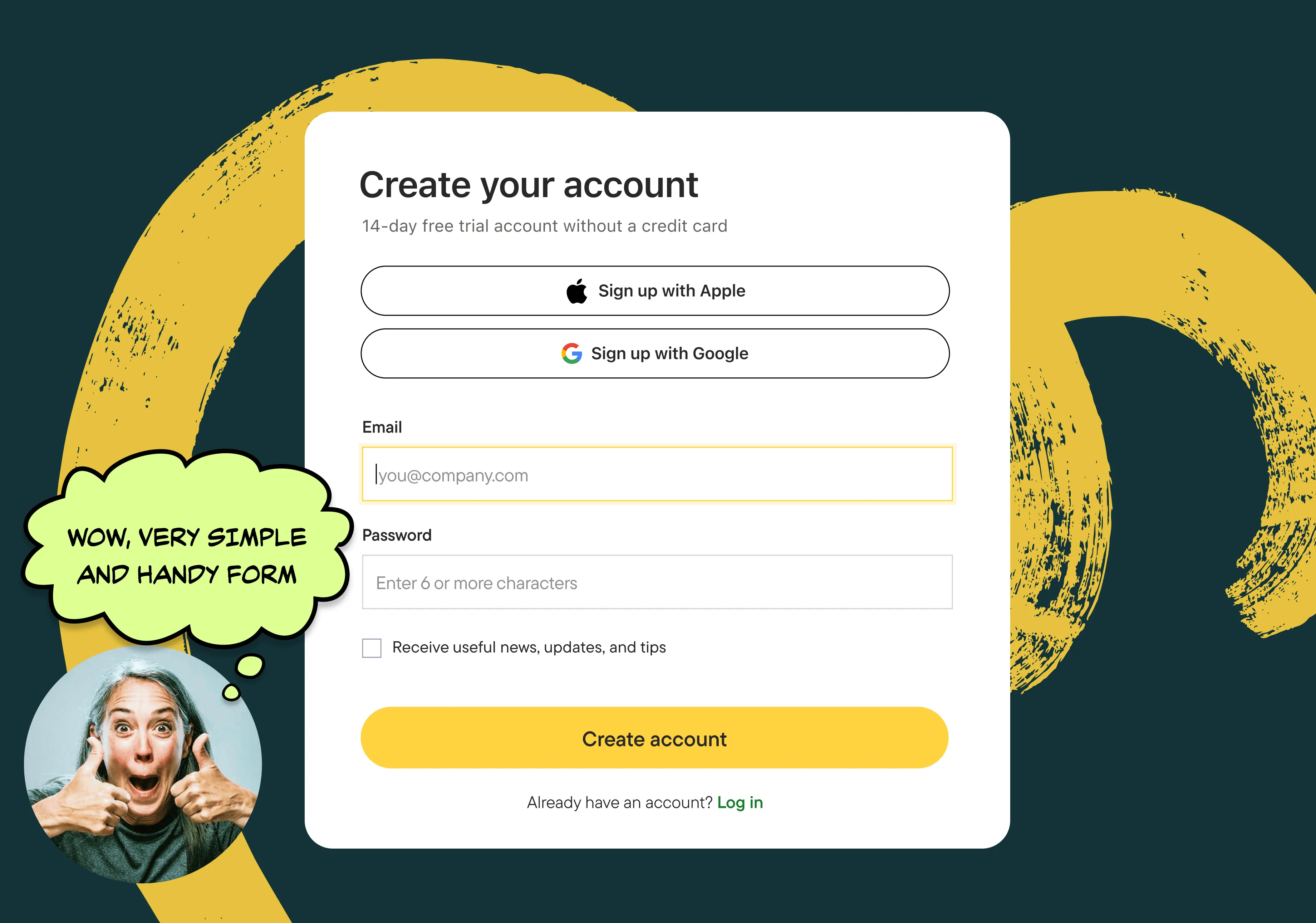We have a team focusing on productivity and joy at work, the People team. Together, we strive to make Bïrch a good place to work for everyone.

Nine out of ten employees name Bïrch's culture as the main driver for their motivation
How does that culture impact some everyday things, like hiring, benefits, and our office environment? Let’s take a closer look together.
A few facts about us to make it easier to imagine what we're talking about.
- The company now has just over 30 employees.
- Birch has an office in Barcelona, but team members can work remotely from anywhere worldwide.
- The average time at company for Bïrch employees is 3 years.
Office
We work in a small two-floor building in Barcelona with a courtyard. The first floor creates an informal environment: there is a large hall where we organize movie screenings, play musical instruments, and record video podcasts.

We even started calling our office a “hub” where you can collaborate with teammates on different things, apart from just working and having lunch together.
You can work from home and visit the office to hang out. For example, you can chat in the kitchen, plant strawberries in the backyard, or grab someone for a chat and talk about anything that's on your mind.
Some Bïrch employees work from home in the morning and come to the office in the afternoon and evening to spend time with colleagues. You can stay in the office until late at night, listen to music, and do whatever you want.
An essential addition — our office has a second floor, with a classic setup. It is quiet and more appropriate for working on your computer.

Hiring
Our CEO, Mike, describes the company as a rock band. But in order to achieve success and become famous around the world, we need to attract top talent.
Bïrch only hires senior-level professionals. Bïrch is a small company focused on growth. We hire each team member to solve a complex problem, often unclear and new to us. This may change in the future, but for now, we don’t have enough resources to educate junior- or middle-level specialists.

This is what our hiring system looks like:
- Every quarter, we draw up a hiring plan based on the company's development plans.
- I prepare a detailed description for each role with the hiring managers. We also involve team members with whom our future colleague will be working to help describe the role.
- We have stopped posting our vacancies on LinkedIn Jobs, as we receive a great amount of responses, most of which are not relevant. However, we continue to share vacancies on our LinkedIn page.
We look for specialists on a point-by-point basis through small communities and recommendations from colleagues.
Our primary hiring strategy right now is targeted headhunting. I identify specific profiles with the right experience and skills, look for such specialists (including through LinkedIn), and personally invite them to apply.
We're constantly tuning up the hiring process. For example, we are improving the onboarding process right now. We have found that the more thoroughly we introduce a new colleague to the company, product, and strategy, the quicker they start producing impactful results.
We have also developed our own small framework for evaluating potential candidates, which we call MEGA.
M stands for Motivation. We are looking for colleagues who are committed to their field of work and see our company as a good environment for their development. We look for people who are curious about what’s going on around them. These things are hard to evaluate, but we still try: sometimes it’s someone who regularly attends conferences, sometimes they have a pet project or have driven a certain initiative in their previous workplace.
E is Expertise. As I mentioned above, we are only considering senior-level professionals. We also assess specific skills (for example, whether programmers work with our technology stack).
G means Globality. Our company operates worldwide, and we value experience in an international environment.
A is Autonomy. We appreciate when colleagues are able to solve problems on their own and don’t like micromanagement.
In addition, we also evaluate cultural fit. This is not easy to define, but after the interviews, we ask ourselves:
— Would you grab a beer or coffee with the candidate?
— Can you see them fitting well into our chats, team events, and day-to-day work?
Bonuses
We invest in benefits to support our team's well-being, personal and professional development.
Travel bonus. We provide each employee with a yearly $2,000 travel budget—wherever they want to go. Bonuses can be used to pay for tickets and hotels. They are renewed at the beginning of each year and can be spent without restrictions.

Educational bonus. Everyone gets $2000 per year for conferences, courses, and educational activities. You can learn anything you want, from Python to how to make cheesecakes.
Bonus for visiting the office. Another $2000 can be spent on flying to Barcelona and working with colleagues. You can come at any time.

We also provide each team member with a laptop and health insurance in their country of residence. We've also extended the essential employee benefits with flexible bank holidays planning, parental support, relocation to Barcelona, and flexible working hours.
The offsites and onsites
Once a year, we all gather to spend time offline together. In 2024, we spent a week in Barcelona, and almost every colleague from Brazil to Ireland joined us. Every day, teams prepared lectures for colleagues, filmed our commercials, and organized a karting championship.

We have been hosting our onsites for eight years now, it’s an important tradition at Bïrch. This year, in addition to the onsite, we’re experimenting with a new format: Work Week. During the first Work Week in May 2025, we invited all team members to come to the office and work without a special agenda. It started with a simple thought: what if we all gather under the same roof and just work on our usual tasks? In the world of hybrid and remote work, we often forget how does an office full of people feel like.
Here’s some feedback our team members shared afterward:
Work Week was great — it felt like a regular week in the office, just with more people around, which was actually really nice. It gave us a chance to have some spontaneous chats and connect with teammates we don’t usually see in person, especially those from other countries. Nothing overly structured, but that made it easy to work and catch up naturally.
I liked the fact that every day there was a meeting of the product team, where people were involved, a lot of good ideas were generated and there was an opportunity for designers to work together in one space.
We saw the limit to our office capacity! It was sometimes hard to even find a free table to work at. Elina and I had a 1on1 on the street 😄
I really enjoyed it, it's been a long time since we had such an intense interaction. We talked about everything, one topic followed another, meeting after meeting.
Maybe we can work together?
You can always find our open vacancies on Bïrch's careers page or our LinkedIn page. Feel free to get in touch!
We have a team focusing on productivity and joy at work, the People team. Together, we strive to make Bïrch a good place to work for everyone.

Nine out of ten employees name Bïrch's culture as the main driver for their motivation
How does that culture impact some everyday things, like hiring, benefits, and our office environment? Let’s take a closer look together.
A few facts about us to make it easier to imagine what we're talking about.
- The company now has just over 30 employees.
- Birch has an office in Barcelona, but team members can work remotely from anywhere worldwide.
- The average time at company for Bïrch employees is 3 years.
Office
We work in a small two-floor building in Barcelona with a courtyard. The first floor creates an informal environment: there is a large hall where we organize movie screenings, play musical instruments, and record video podcasts.

We even started calling our office a “hub” where you can collaborate with teammates on different things, apart from just working and having lunch together.
You can work from home and visit the office to hang out. For example, you can chat in the kitchen, plant strawberries in the backyard, or grab someone for a chat and talk about anything that's on your mind.
Some Bïrch employees work from home in the morning and come to the office in the afternoon and evening to spend time with colleagues. You can stay in the office until late at night, listen to music, and do whatever you want.
An essential addition — our office has a second floor, with a classic setup. It is quiet and more appropriate for working on your computer.

Hiring
Our CEO, Mike, describes the company as a rock band. But in order to achieve success and become famous around the world, we need to attract top talent.
Bïrch only hires senior-level professionals. Bïrch is a small company focused on growth. We hire each team member to solve a complex problem, often unclear and new to us. This may change in the future, but for now, we don’t have enough resources to educate junior- or middle-level specialists.

This is what our hiring system looks like:
- Every quarter, we draw up a hiring plan based on the company's development plans.
- I prepare a detailed description for each role with the hiring managers. We also involve team members with whom our future colleague will be working to help describe the role.
- We have stopped posting our vacancies on LinkedIn Jobs, as we receive a great amount of responses, most of which are not relevant. However, we continue to share vacancies on our LinkedIn page.
We look for specialists on a point-by-point basis through small communities and recommendations from colleagues.
Our primary hiring strategy right now is targeted headhunting. I identify specific profiles with the right experience and skills, look for such specialists (including through LinkedIn), and personally invite them to apply.
We're constantly tuning up the hiring process. For example, we are improving the onboarding process right now. We have found that the more thoroughly we introduce a new colleague to the company, product, and strategy, the quicker they start producing impactful results.
We have also developed our own small framework for evaluating potential candidates, which we call MEGA.
M stands for Motivation. We are looking for colleagues who are committed to their field of work and see our company as a good environment for their development. We look for people who are curious about what’s going on around them. These things are hard to evaluate, but we still try: sometimes it’s someone who regularly attends conferences, sometimes they have a pet project or have driven a certain initiative in their previous workplace.
E is Expertise. As I mentioned above, we are only considering senior-level professionals. We also assess specific skills (for example, whether programmers work with our technology stack).
G means Globality. Our company operates worldwide, and we value experience in an international environment.
A is Autonomy. We appreciate when colleagues are able to solve problems on their own and don’t like micromanagement.
In addition, we also evaluate cultural fit. This is not easy to define, but after the interviews, we ask ourselves:
— Would you grab a beer or coffee with the candidate?
— Can you see them fitting well into our chats, team events, and day-to-day work?
Bonuses
We invest in benefits to support our team's well-being, personal and professional development.
Travel bonus. We provide each employee with a yearly $2,000 travel budget—wherever they want to go. Bonuses can be used to pay for tickets and hotels. They are renewed at the beginning of each year and can be spent without restrictions.

Educational bonus. Everyone gets $2000 per year for conferences, courses, and educational activities. You can learn anything you want, from Python to how to make cheesecakes.
Bonus for visiting the office. Another $2000 can be spent on flying to Barcelona and working with colleagues. You can come at any time.

We also provide each team member with a laptop and health insurance in their country of residence. We've also extended the essential employee benefits with flexible bank holidays planning, parental support, relocation to Barcelona, and flexible working hours.
The offsites and onsites
Once a year, we all gather to spend time offline together. In 2024, we spent a week in Barcelona, and almost every colleague from Brazil to Ireland joined us. Every day, teams prepared lectures for colleagues, filmed our commercials, and organized a karting championship.

We have been hosting our onsites for eight years now, it’s an important tradition at Bïrch. This year, in addition to the onsite, we’re experimenting with a new format: Work Week. During the first Work Week in May 2025, we invited all team members to come to the office and work without a special agenda. It started with a simple thought: what if we all gather under the same roof and just work on our usual tasks? In the world of hybrid and remote work, we often forget how does an office full of people feel like.
Here’s some feedback our team members shared afterward:
Work Week was great — it felt like a regular week in the office, just with more people around, which was actually really nice. It gave us a chance to have some spontaneous chats and connect with teammates we don’t usually see in person, especially those from other countries. Nothing overly structured, but that made it easy to work and catch up naturally.
I liked the fact that every day there was a meeting of the product team, where people were involved, a lot of good ideas were generated and there was an opportunity for designers to work together in one space.
We saw the limit to our office capacity! It was sometimes hard to even find a free table to work at. Elina and I had a 1on1 on the street 😄
I really enjoyed it, it's been a long time since we had such an intense interaction. We talked about everything, one topic followed another, meeting after meeting.
Maybe we can work together?
You can always find our open vacancies on Bïrch's careers page or our LinkedIn page. Feel free to get in touch!

















